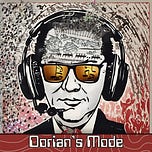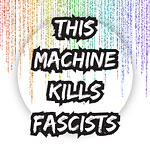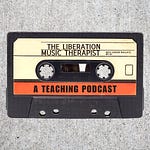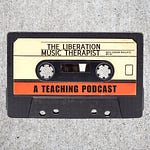In this inaugural episode, Dorian Wallace introduces the Liberation Music Therapist podcast, a series focused on the intersections of music therapy and liberation movements. Dorian, a composer, pianist, and board-certified music therapist, shares his background working with marginalized communities, including prisons, hospice care, and survivors of trauma, while outlining how systemic issues like capitalism and colonialism impact mental health. This episode provides an overview of the key concepts that will be explored throughout the series, which integrates political theory, music, and trauma-informed practices to foster individual and collective healing.
Key Topics Covered:
Introduction to Dorian Wallace and his work in marginalized communities
Overview of Liberation Music Therapy as a tool for social and systemic healing
The podcast aims to demystify "capitalist realism" and its impact on mental health.
Theoretical frameworks: Liberation psychology, feminism, Marxism, post-colonialism, and more
Personal reflections on how political and social shifts influenced Dorian's music therapy practice
Series structure: Eight thematic series covering trauma, music therapy in sociopolitical contexts, and applied practices in clinical settings.
Episode Highlights:
The pressing need for systemic change in mental health care
The healing power of music when applied with intentional focus
Importance of addressing societal structures in therapeutic practices
Acknowledgment of Indigenous lands and the ongoing struggle for Indigenous sovereignty
Links and Resources:
Learn more about Dorian Wallace: www.dorianwallace.com
Support the podcast via Patreon: www.patreon.com/DoriansMode
Subscribe to the Dorian's Mode Substack:
Follow on link tree: https://linktr.ee/doriansmode
Call to Action:
If you found this episode insightful, please consider supporting the podcast on Patreon or subscribing to the newsletter for exclusive content. Follow along for more discussions on how music therapy intersects with liberation and justice movements. Thank you for listening!
Study Guide: Episode 1 - Introduction to Liberation Music Therapy
Episode Overview:
In this episode, the foundational concepts of Liberation Music Therapy are introduced. The episode explains how systemic issues such as capitalism and colonialism contribute to mental health crises and how music therapy can serve as a tool for personal and collective healing. The host outlines the structure of the podcast series, which will focus on trauma-informed approaches, political contexts, and applied music therapy practices while integrating interdisciplinary perspectives from social justice movements and political theory.
Key Concepts:
Liberation Music Therapy
A therapeutic approach that aims to dismantle systemic oppression (e.g., capitalism, colonialism) and foster both individual and collective healing.
Seeks to use music therapy in the context of liberation movements, supporting efforts to reclaim autonomy and promote social justice.
Capitalist Realism and Mental Health
Capitalist realism refers to the pervasive belief that capitalism is the only viable social and economic system.
This belief fosters alienation, stress, and anxiety and contributes to mental health crises by creating environments of scarcity and inequality.
Liberation Music Therapy challenges these assumptions, exploring alternative ways to address mental health within a broader social justice framework.
Interdisciplinary Approach
Liberation Music Therapy draws from various fields, including:
Liberation psychology: Understanding the psychological effects of oppression and exploring liberation as a form of healing.
Feminism and Marxism: Focusing on power dynamics, class struggle, and gender oppression.
Post-colonialism: Addressing the psychological and cultural impacts of colonization.
Critical theory, indigenous thought, and ethnomusicology: Exploring alternative cultural perspectives on healing and wellness.
These interdisciplinary insights provide a more holistic and critical understanding of healing within oppressed communities.
Social and Political Contexts of Healing
Music therapy, traditionally seen as a personal healing tool, can also be used to address collective trauma, particularly in marginalized communities affected by systemic oppression.
Healing practices must consider the larger societal structures that contribute to trauma, such as racism, poverty, and violence.
Series Structure of the Podcast
The podcast is divided into eight thematic series:
Introduction to Liberation Music Therapy
Approaches to Trauma and Healing
Social Forces and Political Context
Music, Identity, and Sociopolitical Contexts
Critical Analysis and Addressing Power
Social Action and Pedagogy in Music Therapy
Clinical Practice and Applied Liberation Music Therapy
Conclusion and Future Directions
Major Themes:
The intersection of Music Therapy and Liberation Movements:
Music therapy can be an effective tool for both personal healing and collective social justice work by addressing the trauma caused by systemic oppression.
Trauma-Informed Practice in Marginalized Communities:
The importance of trauma-informed practices, particularly for marginalized populations, is highlighted. These practices must take into account both the personal trauma and the systemic factors that perpetuate it.
Challenging Oppression Through Music:
Music is not just an art form but also a method of challenging social hierarchies and systemic inequalities. It can create space for personal and collective transformation.
Reflection Questions:
How does capitalist realism influence our understanding of mental health and healing?
Reflect on the belief that capitalism is the only viable system and how this shapes societal views on mental health care.
What role can music play in addressing systemic oppression?
Consider how music, beyond its artistic value, can act as a catalyst for social and political change.
How do interdisciplinary approaches (e.g., liberation psychology and feminism) enhance the practice of music therapy?
Explore how integrating diverse fields of thought can lead to a more comprehensive understanding of mental health and healing.
In what ways can music therapists and mental health professionals engage with political and social justice movements?
Discuss how professionals can use their skills to support movements aimed at dismantling oppression and promoting systemic change.
Discussion Questions for Group Study:
Understanding Liberation Music Therapy
How does Liberation Music Therapy differ from traditional music therapy approaches?
In what ways can this approach address both individual and systemic forms of trauma?
Can you think of examples where music has been used as a tool for social or political liberation? Share specific movements or experiences.
Capitalist Realism and Mental Health
How does the concept of "capitalist realism" influence our perceptions of mental health and well-being?
How do you think capitalist structures contribute to issues like alienation, stress, and anxiety?
What are some ways mental health practices could change if capitalist frameworks did not influence them?
Music and Collective Healing
How can music be used as a tool for both personal and collective healing?
What role does music play in building solidarity among marginalized communities?
Discuss examples of how music has helped address trauma in specific cultural or political contexts.
Interdisciplinary Approach to Music Therapy
Why is it important to incorporate fields such as liberation psychology, feminism, or post-colonialism into music therapy practices?
How does integrating these disciplines enhance our understanding of mental health and healing?
What are the challenges of applying a more political or social justice-oriented approach to therapy?
Trauma-Informed Practice in Marginalized Communities
Why is trauma-informed practice particularly important in working with marginalized or oppressed populations?
How can music therapists ensure they are addressing both personal trauma and systemic factors (e.g., racism, poverty, discrimination) in their work?
What are some examples of trauma-informed music therapy practices you have seen or could imagine implementing?
Social and Political Forces in Therapy
How do societal structures (e.g., capitalism and colonialism) impact the accessibility and effectiveness of mental health care?
Discuss how therapy can be both a personal and a political act. In what ways should therapists engage with social justice movements to support their clients?
How might understanding the political contexts of a client's life change the approach a therapist takes in their sessions?
Applying Liberation Music Therapy in Practice
How do you think music therapists can support liberation movements in their everyday work?
In what ways can therapists use music to help clients reclaim autonomy and agency, especially those from oppressed communities?
How might Liberation Music Therapy be applied in different settings, such as prisons, hospitals, or community spaces?
Reflection on Personal and Collective Responsibility
Reflect on your own experiences with music. How has music shaped your healing or sense of belonging?
How can mental health professionals take responsibility for addressing systemic issues in their practice?
What steps can we take as individuals and as a community to challenge systemic oppression and foster collective healing through music?
Group Activity Idea:
Music and Liberation Sharing Circle:
Have each group member share a song or piece of music that has helped them through a personal or collective struggle. After listening, discuss how the music impacted them emotionally, mentally, or even physically. Reflect on how these songs could contribute to a broader social or political movement for healing.
This study guide is designed to help you explore the key themes and concepts from the first episode of Liberation Music Therapist. Use the reflection and discussion questions to deepen your understanding and encourage critical thinking about the role of music therapy in social justice movements and healing practices.














Share this post